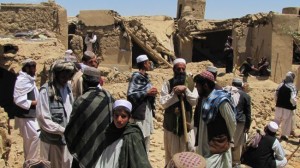[caption id="attachment_39061" align="alignright" width="194"]
 This file photo shows a house which was hit by a NATO airstrike in Logar Province, Afghanistan.[/caption]
This file photo shows a house which was hit by a NATO airstrike in Logar Province, Afghanistan.[/caption]TEHRAN (FNA)- European and American officials always say they need Iran�s help in restoring stability in Afghanistan � just like in Iraq.
In their words: The Islamic Republic of Iran plays a key role in Afghanistan. It is absolutely clear that Iran plays an important role. They have a legitimate role to play in this region�
Just as importantly, NATO officials say the West could only win the war on terror if it engages with all the countries neighboring Afghanistan, including Iran.
Strange enough, the West still thinks - and alleges - that Iran has not been playing a constructive role thus far and that Western diplomats see it as necessary to raise the issue in any given international gathering, i.e., seeking help from Iran to restore stability in the war-torn country. If that is the case, which obviously is, then they are invited to take a closer look at the following facts:
Iran's main policy in Afghanistan has been and still is ensuring stability and sustainable development. The policy was sketched out immediately after the collapse of the Taliban regime in 2001. Since then, Tehran has been supporting the central government in Kabul amid US accusations (helping Taliban guerrillas) and backstabbing (calling Iran as part of the so-called Axis of Evil).
To this end, Tehran has inked several cooperation agreements with Kabul that include development of political/economic ties, trade and reconstruction efforts, fight against illicit drugs, counter-terrorism, and regional/international partnership.
For those with short-term memory, Iran was the first country that began helping Afghanistan to reconstruct its ruined infrastructure and economy. It pledged millions of dollars in aid and loans to its reconstruction projects as well. The policy is almost identical to what Tehran has been doing during the same period in neighboring Iraq.
The financial aid, however, has been spent on infrastructural development projects, technical and training services, plus cash payments. A great portion of these investments is directed towards building roads, bridges and power grids.
Key projects in power sector include electricity supply to border villages in Herat and Nimrouz. Key projects in road construction include building the Dogharoun-Herat road and the extension of Herat Highway to Meymaneh in the north, part of which was carried out by Iranian contractors. The project is very important as it connects the country�s road transportation network to Central Asia.
Further Iranian assistance includes the construction of the Khavaf-Herat Railway. It connects Afghanistan�s railway network to Iran, Central Asia and Europe. And we won�t even talk about the fact that Iran has been housing millions of Afghan refugees for almost four decades now.
As is, the Iran-Afghanistan relations have been given a new lease of life in recent years while the government continues to lay emphasis on the reconstruction policy of Afghanistan as well as playing a part in ensuring its development and stability.
Still, unlike some other international donors, Tehran remains fully committed to its undertakings and respects the Afghan sovereignty, independence, territorial integrity and national unity. Tehran values its cultural-historical ties with Kabul; has always supported peace, stability and security; and has always been there to support its neighbor�s post-war socio-economic development projects and plans.
Under the circumstances, hence, there is no need for Western officials or NATO envoys to ask Tehran to do what it has already been doing for years: Fighting terrorism, deterring the menace of drug cultivation and trafficking, housing refugees, and playing a constructive role in rebuilding the war-torn nation.
By Fars News Agency










